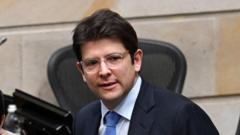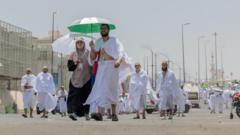In December 2024, the fall of Bashar al-Assad heralded significant changes for Syrians who had long endured oppression. Since Assad's 24-year rule ended, a wave of optimism swept through the nation. Millions celebrated the newfound liberty to discuss politics openly, a right previously unthinkable under the regime. However, four months later, concerns over future governance and the potential for an authoritarian resurgence loom large.
Syrian Liberties in Flux: A Nation Reimagined Post-Assad

Syrian Liberties in Flux: A Nation Reimagined Post-Assad
As Syria embarks on a journey of newfound freedoms after the fall of Assad, questions arise about the stability and longevity of this liberation.
Initially, the atmosphere in places like Rawda Café in Damascus buzzed with political discussions and vibrant cultural exchanges. Those who fled have returned to a scene of celebration and reinvigoration of creative expression, with artists and writers no longer living in fear of censorship. Although Damascus provides a glimpse of hope, deeper issues reflect a complex reality.
The freshly appointed interim government, led by Ahmed al-Sharaa, faces pressure to realize true democratic reforms amid lingering fears of potential Islamist influences. A sense of urgency surrounds the establishment of a legitimate power-sharing structure to prevent a repeat of dictatorship. Yet the political landscape reveals a lack of accountability, essential for a functioning democracy.
Further complicating matters, the role of women and the multiplicity of religious freedoms remain uncertain. Despite historical progress on women's rights, half-measures in new appointments suggest potential backsliding. Meanwhile, social pressures are surfacing, hinting at a possible retraction of the secular fabric of Syrian life.
As the country confronts post-war realities, pressing challenges such as economic hardships, societal divisions, and external pressures threaten to destabilize the fragile achievements. The Syrian populace is left wondering whether the dream of lasting freedom and true democracy will withstand the test of time or fade as past regimes have. Amidst the uncertainty, conversations continue, highlighting the collective hope and resilience of a nation yearning for a better future.
The freshly appointed interim government, led by Ahmed al-Sharaa, faces pressure to realize true democratic reforms amid lingering fears of potential Islamist influences. A sense of urgency surrounds the establishment of a legitimate power-sharing structure to prevent a repeat of dictatorship. Yet the political landscape reveals a lack of accountability, essential for a functioning democracy.
Further complicating matters, the role of women and the multiplicity of religious freedoms remain uncertain. Despite historical progress on women's rights, half-measures in new appointments suggest potential backsliding. Meanwhile, social pressures are surfacing, hinting at a possible retraction of the secular fabric of Syrian life.
As the country confronts post-war realities, pressing challenges such as economic hardships, societal divisions, and external pressures threaten to destabilize the fragile achievements. The Syrian populace is left wondering whether the dream of lasting freedom and true democracy will withstand the test of time or fade as past regimes have. Amidst the uncertainty, conversations continue, highlighting the collective hope and resilience of a nation yearning for a better future.





















